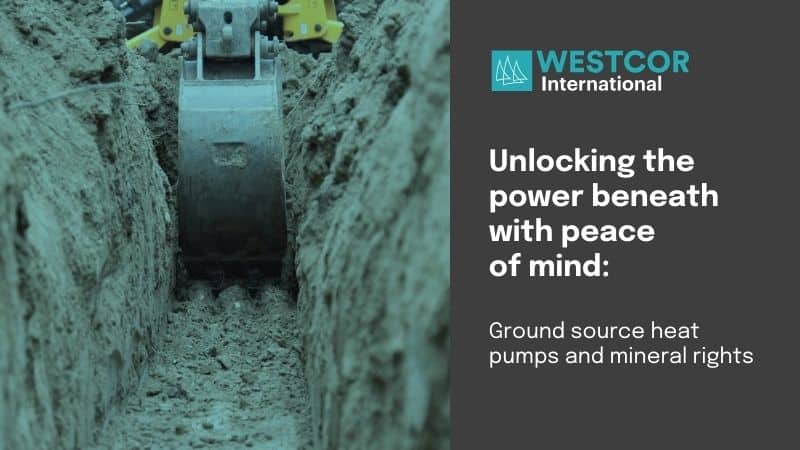Unlocking the Power Beneath with Peace of Mind: Ground Source Heat Pumps and Mineral Rights
With the general election on the horizon, many parties have outlined their commitments to reducing the costs and the environmental impact of heating buildings and homes. Regardless of political affiliation, there is a consensus that switching to heat pumps will help cut greenhouse emissions.
The current government’s target is to stop installing gas boilers in new buildings after 2025. Ground source heat pumps (GSHPs) may well become the new norm for households and businesses, although it is unclear what a new government will bring in terms of subsidies and targets.
How Do Ground Source Heat Pumps Work?
A ground source heat pump extracts low-temperature solar energy stored in the ground or water using buried pipework, usually via a loop of pipes called the “ground loop.” This system compresses the energy to a higher temperature, providing a property with 100% of its heating and hot water needs.
The system includes:
The Ground Array: This can include horizontal pipes or a vertical array using tubes inserted into boreholes.
The Pump: This varies in size depending on the property’s requirements.
Installation Considerations
Before installation, the ground is typically surveyed to ensure there is sufficient space for the ground loop. Space is a crucial factor both outside and inside any property to ensure the heat pump operates effectively. Additionally, experts recommend that the property be well-insulated before the pump is installed.
Benefits and Applications
Using a heat pump can help consumers with their energy bills and improve energy performance for businesses. Agricultural landowners can diversify their land use, integrating heat pumps with traditional farming activities. Additionally, combining heat pumps with other renewable technologies like solar panels and battery storage may become more common as we approach the 2050 UK net-zero target.
Potential Land Issues and Title Defects
While installation of heat pumps is generally straightforward, potential property title issues may arise. For instance, if the ground loop is installed below the surface and vertical boreholes are dug, there is a risk of disturbing the minerals below the surface. Commercial and residential sites often have mines and minerals reservations in favour of third parties, which could be technically breached by the pipework. If boreholes extend deep into the ground, they might interfere with these reservations. This can lead to legal disputes or financial claims for trespass and/or mineral extraction without permission.
Role of Title Insurance
Title insurance can provide homeowners or residential developers with peace of mind in these circumstances. If a third party claims that the minerals have been disturbed or a trespass risk has crystallised as a result of a reservation in the title deeds to the property, a title insurance policy can cover a range of losses for the insured party including a diminution in the value of the property as a result of a claim, any sums due as a result of a Court Order and interest due under the terms of any mortgage/fixed charge over the property for a specified period
Heat pumps may seem like a novel concept for those still using boilers, but they are likely to become more common regardless of the election outcome. With Westcor’s expertise and significant experience in energy projects, we are ready to assist with any title-related issues.
By addressing potential title defects and understanding the importance of mineral rights, property owners and developers can confidently install ground source heat pumps, contributing to a greener future while safeguarding their investments.






